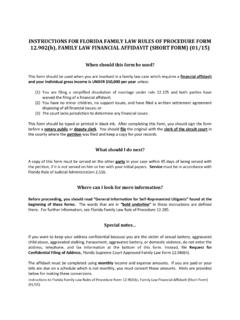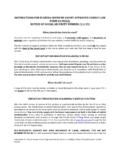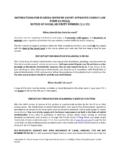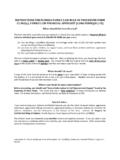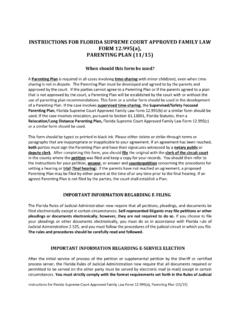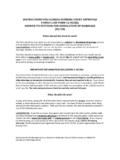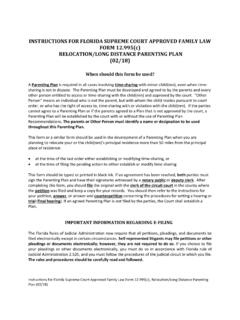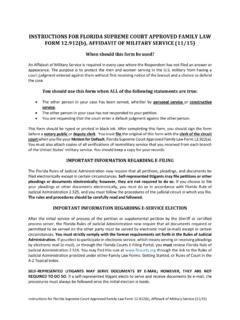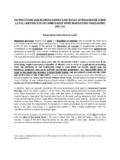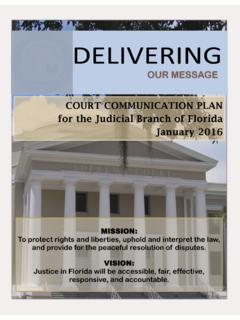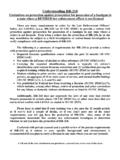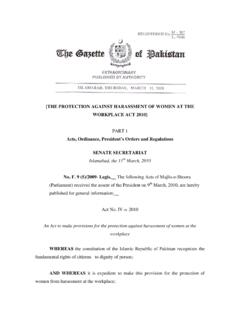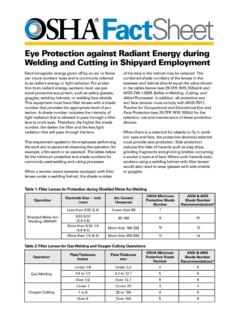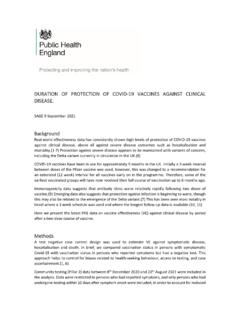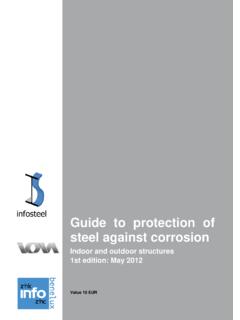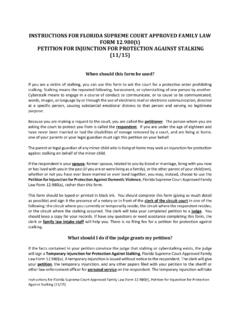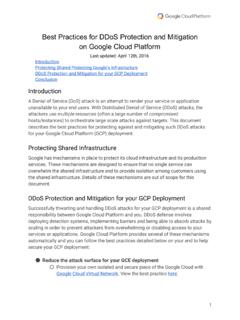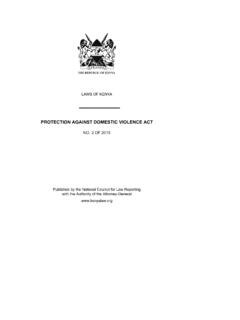Transcription of Florida Family Law Rules of Procedure Form 12.980a ...
1 INSTRUCTIONS FOR Florida SUPREME COURT APPROVED Family LAW FORM (a) PETITION FOR injunction FOR protection AGAINST domestic violence (11/15) When should this form be used? If you are a victim of any act of domestic violence or have reasonable cause to believe that you are in imminent danger of becoming a victim of domestic violence , you can use this form to ask the court for a protective order prohibiting domestic violence . Because you are making a request to the court, you are called the petitioner. The person whom you are asking the court to protect you from is called the respondent. domestic violence includes: assault, aggravated assault, battery, aggravated battery, sexual assault, sexual battery, stalking, aggravated stalking, kidnapping, false imprisonment, or any other criminal offense resulting in physical injury or death to petitioner by any of petitioner s Family or household members.
2 In determining whether you have reasonable cause to believe you are in imminent danger of becoming a victim of domestic violence , the court must consider all relevant factors alleged in the petition, including, but not limited to the following: 1. The history between the petitioner and the respondent, including threats, harassment, stalking, and physical abuse. 2. Whether the respondent has attempted to harm the petitioner or Family members or individuals closely associated with the petitioner. 3. Whether the respondent has threatened to conceal, kidnap, or harm the petitioner s child or children. 4. Whether the respondent has intentionally injured or killed a Family pet. 5. Whether the respondent has used, or has threatened to use, against the petitioner any weapons such as guns or knives. 6. Whether the respondent has physically restrained the petitioner from leaving the home or calling law enforcement.
3 7. Whether the respondent has a criminal history involving violence or the threat of violence . 8. The existence of a verifiable order of protection issued previously or from another jurisdiction. 9. Whether the respondent has destroyed personal property, including, but not limited to, telephones or other communications equipment, clothing, or other items belonging to the petitioner. 10. Whether the respondent engaged in any other behavior or conduct that leads the petitioner to have reasonable cause to believe that he or she is in imminent danger of becoming a victim of domestic violence . The domestic violence laws only apply to your situation if the respondent is your spouse, former spouse, related to you by blood or marriage, living with you now or has lived with you in the past (if you are or were living as a Family ), or the other parent of your child(ren) whether or not you have ever been married or ever lived together.
4 With the exception of persons who have a child in common, the Family or household members must be currently residing together or have in the past resided together in the same Instructions for Florida Supreme Court Approved Family Law Form (a), Petition for injunction for protection Against domestic violence (11/15) single dwelling unit. If the respondent is not one of the above, you should look at Petition for injunction for protection Against Repeat violence , Florida Supreme Court Approved Family Law Form (f), to determine if your situation will qualify for an injunction for protection against repeat violence , or Petition for injunction for protection Against Dating violence , Florida Supreme Court Approved Family Law Form (n), to determine if your situation will qualify for an injunction for protection against dating violence , or Petition for injunction for protection Against Sexual violence , Florida Supreme Court Approved Family Law Form (q), to determine if your situation will qualify for an injunction for protection against sexual violence .
5 If you are under the age of eighteen and you have never been married or had the disabilities of nonage removed by a court, then one of your parents, custodians, or your legal guardian must sign this petition with you. This form should be typed or printed in black ink. You should complete this form (giving as much detail as possible) and sign it in front of a notary public or the clerk of the circuit court in the county where you live. The clerk will take your completed petition to a judge. You should keep a copy for your records. If you have any questions or need assistance completing this form, the clerk or Family law intake staff will help you. What should I do if the judge grants my petition? If the facts contained in your petition convince the judge that you are a victim of domestic violence or that an imminent danger of domestic violence exists, the judge will sign either an immediate Temporary injunction for protection Against domestic violence with Minor Child(ren), Florida Supreme Court Approved Family Law Form (c)(1) or an immediate Temporary injunction for protection Against domestic violence without Minor Child(ren), Florida Supreme Court Approved Family Law Form (c)(2).
6 A temporary injunction is issued without notice to the respondent. The clerk will give your petition, the temporary injunction , and any other papers filed with your petition to the sheriff or other law enforcement officer for personal service on the respondent. The temporary injunction will take effect immediately after the respondent is served with a copy of it. It lasts until a full hearing can be held or for a period of 15 days, whichever comes first. The court may extend the temporary injunction beyond 15 days for a good reason, which may include failure to obtain service on the respondent. The temporary injunction is issued ex parte. This means that the judge has considered only the information presented by one side-- YOU. The temporary injunction gives a date that you must appear in court for a hearing. At that hearing, you will be expected to testify about the facts in your petition.
7 The respondent will be given the opportunity to testify at this hearing, also. At the hearing, the judge will decide whether to issue either a Final Judgment of injunction for protection Against domestic violence with Minor Child(ren)(After Notice), Florida Supreme Court Approved Family Law Form (d)(1), or a Final Judgment of injunction for protection Against domestic violence without Minor Child(ren)(After Notice), Florida Supreme Court Approved Family Law Form (d)(2). Either of these final judgments will remain in effect for a specific time period or until modified or dissolved by the court. If either you or the respondent do not appear at the final hearing, the temporary injunction may be continued in force, extended, or dismissed, and/or additional orders may be granted, including entry of a permanent injunction and the imposition of court costs. You and respondent will be bound by the terms of any injunction issued at the final hearing.
8 Instructions for Florida Supreme Court Approved Family Law Form (a), Petition for injunction for protection Against domestic violence (11/15) IF EITHER YOU OR RESPONDENT DO NOT APPEAR AT THE FINAL HEARING, YOU WILL BOTH BE BOUND BY THE TERMS OF ANY injunction ISSUED IN THIS MATTER. If the judge signs a temporary or final injunction , the clerk will provide you with the necessary copies. Make sure that you keep one certified copy of the injunction with you at all times! What can I do if the judge denies my petition? If your petition is denied solely on the grounds that it appears to the court that no imminent danger of domestic violence exists, the court will set a full hearing, at the earliest possible time, on your petition, unless you request that no hearing be set.
9 The respondent will be notified by personal service of your petition and the hearing. If your petition is denied, you may: amend your petition by filing a Supplemental Affidavit in Support of Petition for injunction for protection Against domestic violence , Repeat or Dating violence , Florida Family Law Form (g); attend the hearing and present facts that support your petition; and/or dismiss your petition. Where can I look for more information? Before proceeding, you should read General Information for Self-Represented Litigants found at the beginning of these forms. The words that are in bold underline are defined in that section. The clerk of the circuit court or Family law intake staff will help you complete any necessary domestic violence forms and can give you information about local domestic violence victim assistance programs, shelters, and other related services. You may also call the domestic violence Hotline at 1-800-500-1119.
10 For further information, see Chapter 741, Florida Statutes, and Rule , Florida Family Law Rules of Procedure . IMPORTANT INFORMATION REGARDING E-FILING The Florida Rules of Judicial Administration now require that all petitions, pleadings, and documents be filed electronically except in certain circumstances. Self-represented litigants may file petitions or other pleadings or documents electronically; however, they are not required to do so. If you choose to file your pleadings or other documents electronically, you must do so in accordance with Florida Rule of Judicial Administration , and you must follow the procedures of the judicial circuit in which you file. The Rules and procedures should be carefully read and followed. IMPORTANT INFORMATION REGARDING E-SERVICE ELECTION After the initial service of process of the petition or supplemental petition by the Sheriff or certified process server, the Florida Rules of Judicial Administration now require that all documents required or permitted to be served on the other party must be served by electronic mail (e-mail) except in certain circumstances.
